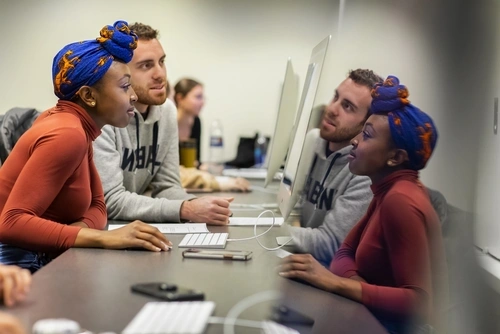Overview

This program aims to engage professionals in exploring the benefits and challenges of using AI in education. Through the course, gain exposure to AI tools to support teaching and learning, as well as develop a greater capacity to perceive the nuances and dilemmas of this technology, pedagogy, and its effect on education.
You will engage in a series of live virtual workshops where you will design learning activities and experiences that you intend to implement in your own classroom.
Program Details
-
4 CEs University of Pennsylvania Continuing Education Credits
-
120 Pennsylvania ACT 48 Credits
-
May 2026 Grades will be awarded
About the Program
Workshops in previous program cohorts have included:
- Introduction to AI Ecosystem and Current Tools
- An Introduction to AI: Understanding the scope of what foundation models can do
- Considering the dangers of using AI in the classroom and supporting students to be thoughtful users of AI tools
- Integrating AI to augment student thinking and collaboration
- Designing writing assignments with AI
Upon successful completion of the certificate, you’ll be able to:
- Utilize tools such as Generative AI and Agentic AI to enhance research capabilities and streamline workflows.
- Implement AI-assisted methodologies to analyze complex data sets, identify patterns, and generate meaningful insights with greater efficiency.
- Leverage machine learning algorithms to automate repetitive tasks, allowing teams to focus on high-value creative and strategic activities.
- Use AI tools such as Elicit, Perplexity, Anthropic (Claude), OpenAI (ChatGPT), Magic School, Google (Gemini, NotebookLM), Gamma, Suno, NapkinAI, among others in three stages: Data collection, Data Processing, Data Presenting.
- Apply scaffolding techniques taught by Penn GSE faculty experts in instructional design and learning technologies to enhance your curriculum.
- Assess how AI affects students' abilities to learn.
- Make informed decisions regarding AI implementation, usage, and policies.
Spring 2026 Schedule
| Dates | Time Commitments | Session |
|---|---|---|
| January 14, 2026 | 5:00-7:00 p.m. (ET) | Opening Session - The AI Education Revolution (Julio Zelaya) |
| January 26, 2026 | 5:00-7:00 p.m. (ET) | Navigating AI Safely - Ethics & Student Support |
| January 28, 2026 | 5:00-7:00 p.m. (ET) | Mastering the Craft - AI Teaching Best Practices |
| February 2, 2026 | 5:00-7:00 p.m. (ET) | The Agile AI Mindset |
| February 4, 2026 | 5:00-7:00 p.m. (ET) | Under the Hood - AI Capabilities & Analytics |
| February 9, 2026 | 5:00-7:00 p.m. (ET) | Implementation Masterclass |
| February 17, 2026 | 5:00-7:00 p.m. (ET) | Home Team Session 1 - Project Development |
| February 23, 2026 | 5:00-7:00 p.m. (ET) | Home Team Session 2 |
| April 14, 2026 | 5:00-7:00 p.m. (ET) | Grand Finale - Project Presentations |
Take the Next Step
Simply click the Register Now button to create an account and submit an application. Or if you need more information to make an informed decision we encourage you to click Request Information.
Program Instructors
Questions?
Do you have questions about our the program? We're here to help!



